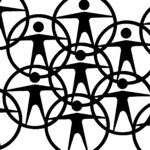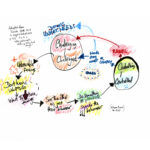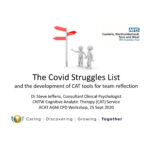While the Cognitive Analytic Therapy model first developed as an individual therapy, its ideas are now applied in a range of different ways. These include consultation with teams, organisational development and other developments in the community.
Some current examples are given here.
 CAT consultation with teams
CAT consultation with teams
CAT is used as a framework for supporting staff teams to work with people in a range of health and other settings . CAT Care Planning based on a five-session model is used widely. Other models include Team Formulation and Reflective Practice
You can read more about Five Session CAT Care Planning by clicking on this link.
 Reducing Restraint
Reducing Restraint
The CAT model has been used to help staff teams reduce restrictive practice, including restraint and seclusion, in learning disability services.
Read more about how CAT can help to reduce restrictive practice by clicking on this link
 The COVID Struggles List
The COVID Struggles List
The COVID Struggles List was developed as a tool to help staff teams in Cumbria, Northumberland, Tyne and Wear NHS Foundation Trust consider and share how the COVID 19 pandemic was affecting themselves and their work.
CAT in educational settings
Pupils and staff in educational settings are also benefitting from the use of CAT approaches in creating relationally skilled educational environments. Read more about some examples of CAT in educational settings by clicking here.
 CAT in a guided self help format for problematic anxiety
CAT in a guided self help format for problematic anxiety
All areas in England now have access to brief psychological therapies for common mental health difficulties (i.e. anxiety and depression). This is provided as part of the Improving Access to Psychological Therapies (IAPT) programme.
Step 2 of the IAPT programme offers guided-self-help. Researchers in Sheffield have developed a client self help manual for anxiety using cognitive analytic theory. Research is underway to test how this compares with a CBT intervention. You can read more about CAT guided self help for anxiety by clicking on this link.
 Using CAT in services for people with multiple and complex needs
Using CAT in services for people with multiple and complex needs
CAT reflective practice has been used to help organisations and staff work more helpfully with people who have multiple and complex needs including homelessness, criminality and substance use. Read more about how CAT has been integrated into services delivered by YMCA Together by clicking here.
 Adapting CAT to help self-harm
Adapting CAT to help self-harm
Aspects of the CAT model have been combined with another therapy approach called Psychodynamic Interpersonal Therapy (PIT). Together they form a model of brief talking therapy for people who present to hospital emergency departments after harming themselves. A recent study describes an evaluation of the Hospital Outpatient Psychotherapy Engagement (HOPE) service based at a hopsital in the north west. Nurses and liaison psychiatry team staff offer up to four sessions of this CAT-informed therapy, with the option of a fifth follow up session. Results of this evaluation have been positive but further research into the approach is needed. Read more about the HOPE service evaluation by clicking on this link.
CAT Through Others by ACAT Public Engagement Team
CC BY-SA 4.0